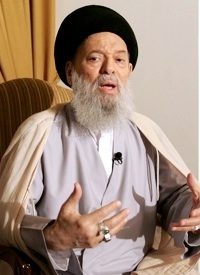
Octavia Nasr, a senior Middle East editor at CNN, has been fired from her position after writing in a post on Twitter that she “respected” Ayatollah Mohammed Hussein Fadlallah — a Lebanese Shia Muslim leader with links to the terrorist group Hezbollah who died on July 4. Nasr wrote: “Sad to hear of the passing of Sayyed Mohammed Hussein Fadlallah…. One of Hezbollah’s giants I respect a lot.”
Parisa Khosravi, senior vice president of CNN International Newsgathering, said in a memo: "At this point, we believe that [Nasr’s] credibility in her position as senior editor for Middle Eastern affairs has been compromised going forward. As a colleague and friend we’re going to miss seeing Octavia everyday."
The memo also said that Nasr "fully accepts that she should not have made such a simplistic comment without any context whatsoever."
Nasr noted that Fadlallah was "revered across borders yet designated a terrorist. Not the kind of life to be commenting about in a brief tweet. It’s something I deeply regret."
“Tweets” are limited to 140 characters and are generally used for status messages among friends.
A report from JTA (a Jewish-oriented news service) quoted from Nasr’s subsequent blog, in which she explained her brief Tweet
"I used the words ‘respect’ and ‘sad’ because to me, as a Middle Eastern woman, Fadlallah took a contrarian and pioneering stand among Shia clerics on woman’s rights," Nasr wrote. "He called for the abolition of the tribal system of ‘honor killing.’ He called the practice primitive and non-productive. He warned Muslim men that abuse of women was against Islam."
An article from Al Jazeera, the Middle East news agency, reported:
Fadlallah was a divisive figure who was often described as the "spiritual guide" of Hezbollah, the Shia Lebanese political party. However, he never held a role within the organization.
He did support some of its actions, endorsing suicide attacks against Israel and was placed on a terrorist blacklist by the US. [Emphasis added.]
Hezbollah (which means “Party of God” in Arabic) started as a militia in Lebanon during the Lebanese Civil War, in response to the Israeli occupation of southern Lebanon in March 1978. Israel had invaded the region in response to attacks on Israeli territory by PLO terrorist based in Lebanon. After withdrawing from most of the region later that year, the Israelis installed the South Lebanon Army (SLA), a combined Christian and Shia militia under its control, to police the area.
During its civil war period, control of Lebanon was divided among a number of militia groups, some controlled by Christians, some by Shia Muslims, some by Sunni Muslims, as well as more radical groups such as the PLO. Hezbollah’s strength outdistanced most of the others, however. The group modeled its actions after the Iranian revolution of 1979 and received support from about 1,500 Iranian guards. This Iranian assistance greatly facilitated Hezbollah’s development into a potent fighting force. (Ironically, Saddam Hussein gave support to Christian militia groups in Lebanon to counter Iran’s influence in buidling up Hezbollah.)
As it grew in strength, Hezbollah evolved into a full-fledged terrorist organization that repeatedly called for Israel’s destruction. Its flag, which depicts a communist-made AK-47 automatic rifle, is indicative of the organization’s decidedly non-peaceful bent. It is officially considered to be a terrorist organization by the United States, Israel, Canada, and the Netherlands.
In addition to Iran, Hezbollah has also received arms and training from communist North Korea.
Hassan Nasrallah, the secretary general of the Hezbollah organization, revealed his radical views in an interview with the Washington Post on February 20, 2000:
I am against any reconciliation with Israel. I do not even recognize the presence of a state that is called "Israel." I consider its presence both unjust and unlawful. That is why if Lebanon concludes a peace agreement with Israel and brings that accord to the Parliament our deputies will reject it; Hezbollah refuses any conciliation with Israel in principle.
Nasrallah also revealed his extreme anti-Semitism in a speech delivered in Beirut and aired on Al-Manar TV in September 28, 2001:
What do the Jews want? They want security and money. Throughout history the Jews have been Allah’s most cowardly and avaricious creatures. If you look all over the world, you will find no one more miserly or greedy than they are.
Nasrallah is closely linked with Hamas leader, Khaled Meshaal, who was last known to have resided in Damascus, Syria.
So radical are Hezbollah and Hamas that the former head of the radical PLO, Yassir Arafat — in an attempt to cultivate a more moderate image — staged gun battles with and arrested members of both groups.
The many competing factions and terrorist organizations competing for control in the Middle East are unquestionably difficult to track. However, Octavia Nasr, a Beirut native with a degree from the Lebanese American University and 20 years’ experience with CNN covering the region, had advantages that many others do not. She could hardly have escaped knowledge of Fadlallah’s support of Hezbollah, an organization with such an unsavory reputation that even Yasir Arafat shunned it, and that should have disqualified him from being the object of her “respect.” It is unfortunate that she did not exercise more discretion.
Photo of Ayatollah Mohammed Hussein Fadlallah: AP Images



